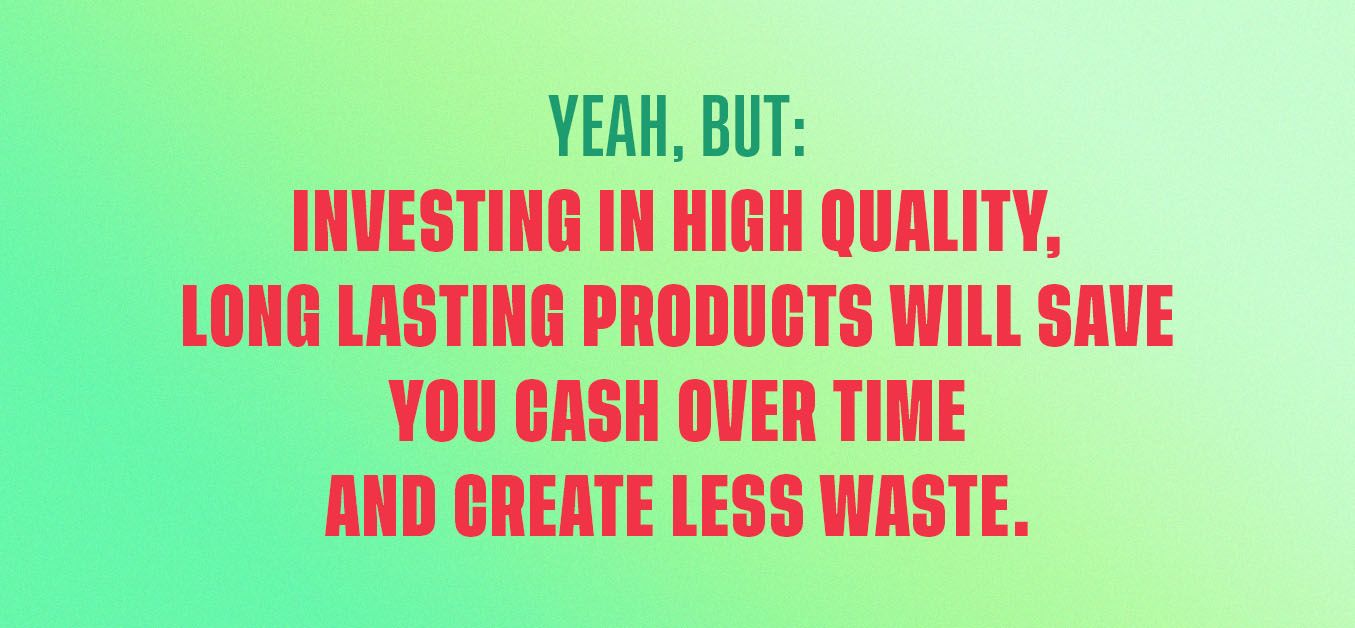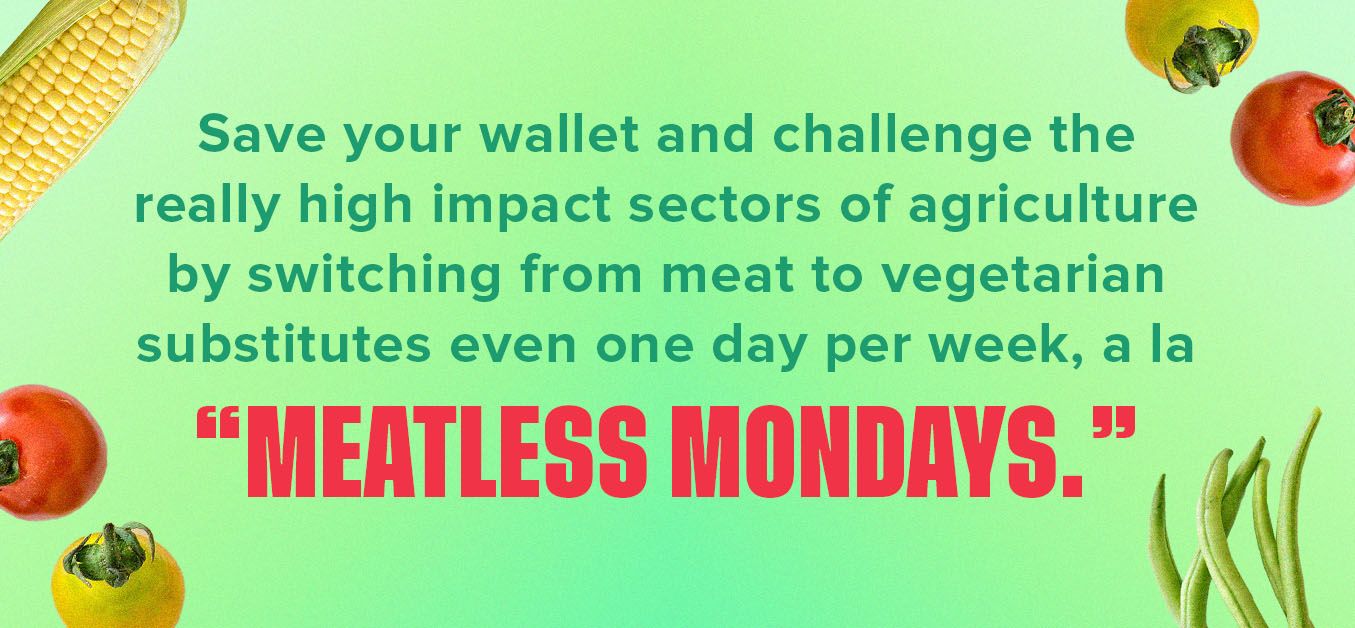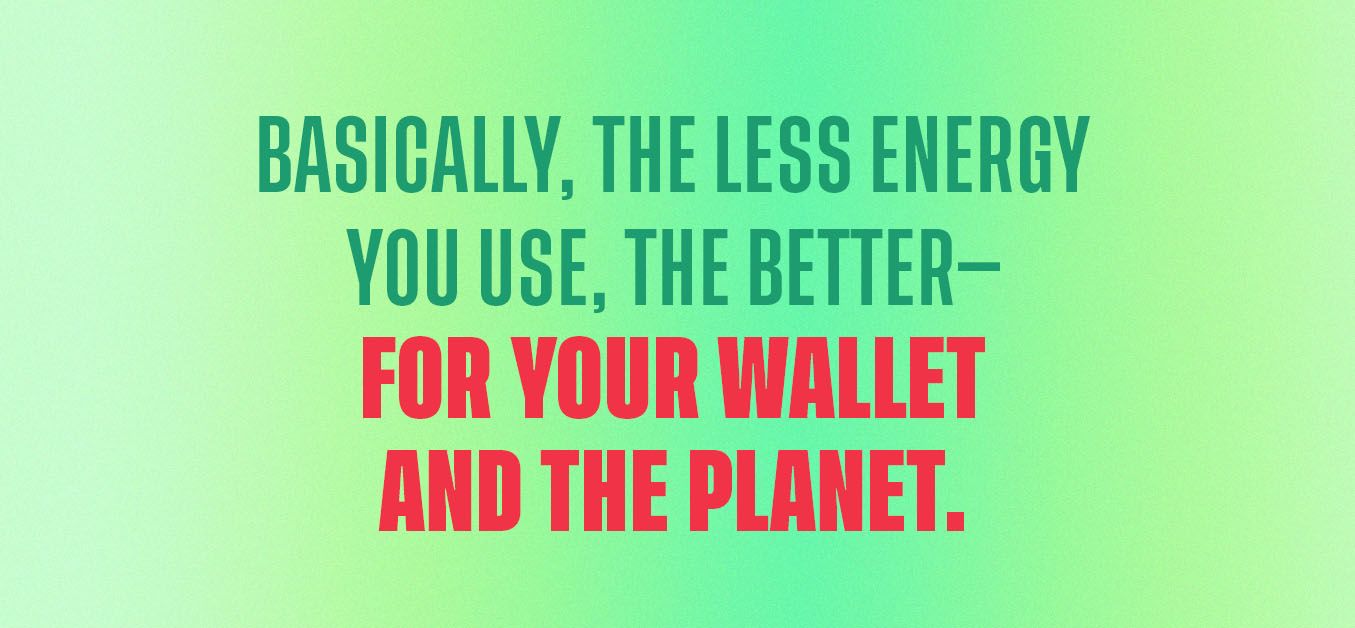5 Ways You Can Save Money & The Environment
Caring for the environment and your cash is easier than you might think. Here are 5 ways you can improve your finances and protect the environment.
Can you actually save money while saving the planet? For a long time, it seemed unlikely. In many cases, shopping on Amazon is still cheaper—at face value—than shopping at local small businesses.
But y’all, you can have the best of both worlds. Find out how to green your finances below!
BTW—keen to upgrade your positive impact on the climate for free? Check out Code Red Mode, our eco-friendly initiative that turns the Mogo Visa* Platinum Prepaid Card into a tree-planting, carbon-sucking machine. For every MogoCard tap, we’ll plant a tree for you, for free.
5 Ways You Can Save Money & The Environment
Below, we’ve listed five ways you can save money while positively—or less negatively—impacting the planet. But naturally, the list goes on (and on, and on).
These five modes are underscored by really simple logic: invest in things that last, opt for processes which use less energy, and make choices that decrease how far goods have to travel to reach you.
We challenge you to consider other simple changes you can make that will support a healthy planet and a thicc wallet.
1. Invest in Reusable Goods
When was the last time you bought a plastic water bottle? I bet ya it wasn’t recently. And that’s a good thing.
There are so many aesthetically pleasing and useful reusable water bottles on the market now that most of us are on board. We don’t want our water bottles to wind up in the ocean and make dolphins sad. So we have a glass of wine one evening and buy a $40 Swell bottle online. But you know what, damn it? It’s worth it. For the dolphins.
What other disposable, single use items can you ditch in favour of long lasting, good looking products? There are lots. Think cotton pads, tote bags, Q-tips, masks, ziplock bags, cling film, coffee pods, or razors. Yes! There are easy to use alternatives for all of these super common household items.
Wait a minute, we’re supposed to be saving money here—and spending $40 on a water bottle or $30 on a safety razor is a lot more than we normally pay for water on the go and smooth gams.
Yeah, but: investing in high quality, long lasting products will save you cash over time and create less waste. Reusable cotton pads might cost about $12 up front, but you can use them forever. It’s a no brainer.

2. Cut Down Your Meat Consumption
We’re not here pushing a vegan or vegetarian diet, y’all, so don’t get fussy. We’re just here with some facts. You wanna save cash and the planet?
Beans, tofu, rice, nuts, and other legumes are often only a fraction of the cost of meat. You get way more nutrient dense calories for way less cash by going vegetarian.
And then there’s the environmental impact of meat production. Y’all, it ain’t good. Meat and dairy production accounts for around 14.5% of greenhouse gas emissions globally, according to the UN's Food and Agricultural Organization.

This one’s a gimme! Save your wallet and challenge the really high impact sectors of agriculture by switching from meat to vegetarian substitutes even one day per week, a la “Meatless Mondays.”
The change doesn’t need to be huge to have an impact. Start with one day a week, and see how you get on.
You’ll thank yourself, the planet will thank you, cows will thank you, and your wallet will thank you. That’s four entire thank yous.
3. Shop Local (Seriously!)
There are a multitude of hot takes on whether or not buying local is good or actually bad for our environment, economy, and social lives.
Our stance? We’re on Team Local.
Why? Here are three really good reasons:
• Our local products travel much smaller distances to reach us, cutting down on carbon emissions produced by transport industries;
• A greater percentage of every dollar spent at a local, small business is recirculated in our own economies; and
• Locally made goods are usually produced by folks receiving higher wages and benefits; these products are also often made to higher standards and are less likely to obsolesce.
Again: invest in high quality products to spend less and create less waste over time. Bonus points for supporting local small business owners.
We’re not saying you should buy every product locally. But there are lots of goods that just make sense to source from your own backyard.
4. Cut Down On Energy Usage
A list, straight from the mouth of every Dad with that thermostat spidey sense:
Shut off the lights when you leave a room. Better yet: switch to LED bulbs. Unplug your appliances when they’re not in use. Don’t run the dishwasher unless it’s full. Wash your clothes on a cold cycle. Turn off your TV when you’re not watching it. Invest in energy efficient appliances. Replace or repair the weather stripping on your windows and doors to keep out draughts, or switch to double glazed panes. Keep your thermostat low and turn off the heat when you leave the house. Just put on a dang sweater!!
These suggestions are also total gimmes; saving cash and helping the environment is a straightforward operation.

Dare you to go shut off one unnecessary light right now! It’s a dare, you have to do it!
5. Ditch Your Car (At Least Sometimes)
Depending on where you live and your level of personal comfort and mobility, it may be necessary for you to own and drive a car everyday. You know what’s best for you.
But if you’re able to give up your car, or cut down on driving, you’ll be shocked at how quickly savings could start to pile up.
Cars are money pits. They depreciate as soon as you drive them off the lot. And gas prices? Liable to give you an aneurysm every time you fill up.
Yep, you know the drill: trade your car for cycling or public transport and you’ll be doing some seriously heavy lifting in the morality department.
In fact, according to the National Observer, Canada’s cars are the dirtiest in the world! Woof!
Instead, pick up a sexy lil bike and start whippin’ to work. You’ll save money. You’ll help the planet. And you’ll wind up with real sexy calves.
Improve Your Finances and Protect the Environment with Mogo

(For the record—if 1 in every 5 Canadians moved their purchases to the MogoCard, we’d plant enough trees to make all of Canada climate positive. Yeah. Get on board, y’all.2)
MogoCard can also help you control your spending. Because it’s a prepaid card, you can’t overspend. We also give you regular reminders to keep you up to date on your remaining balance, and we let you know how much you helped the planet when you purchased your locally made sweater and a brick of sustainably sourced tofu.
These simple changes can have a serious impact on your financial health and on our planet. The vibes? They are immaculate. Get your MogoCard and start saving today ~*~ 💰💸
| GO TO MOGOCARD |
This blog is provided for informational purposes only.
*Trademark of Visa International Service Association and used under licence by Peoples Trust Company. Mogo Visa Platinum Prepaid Card is issued by Peoples Trust Company pursuant to licence by Visa Int. and is subject to Terms and Conditions, visit mogo.ca for full details. Your MogoCard balance is not insured by the Canada Deposit Insurance Corporation (CDIC). MogoCard means the Mogo Visa Platinum Prepaid Card.
1-According to research conducted by Veritree Technology Inc. 500 lbs. is an approximate amount based on Above-Ground-Carbon (AGC) and Below Ground Carbon (BGC) sequestration estimates contained in several scientific research papers regarding the carbon sequestration of Mangrove trees (the “Research”). The Research contains various ranges for the rate of carbon sequestration per hectare of land. In order to arrive at the approximate amount of 500 lbs., Veritree triangulated data points from the Research regarding AGC and BGC sequestration estimates, and then converted those results into the approximate amount of lbs. per tree. An average Canadian emits approximately 42,000 lbs of CO2 in one year. Each tree will absorb approximately 500lbs of CO2 over its lifetime (approximately 25 years). For every purchase made with the MogoCard, a tree will be planted. If you used your MogoCard for 10 purchases each month, 10 trees would be planted. If 10 trees were planted every month for a year, that would be 120 trees, and those 120 trees would absorb a combined total of 60,000 lbs of CO2 over their lifetimes (25 years), making the average Canadian climate positive. Learn more: We're in Code Red Mode
2-Based on the most recently available data from 2019 and assuming future data follows a similar trajectory, there were approximately 17.79 billion transactions performed by Canadians on credit cards, debit cards, cash, prepaid cards and ATMs. 17.79 billion transactions divided by approx. 30.7 million Canadians aged 18 or older in 2019, results in an average of approximately 578 transactions per Canadian aged 18 or older in 2019. If 1 out of 5 Canadians aged 18 or older used the MogoCard, that would be 6.1 million Canadians aged 18 or older using the MogoCard (20% of 30.7 million). If each of those 6.1 million Canadians made 578 transactions, that would mean 578 trees would be planted for each of those 6.1 million Canadians, resulting in a total of approximately 3.5 billion trees being planted. 3.5 billion trees multiplied by 500 lbs. of CO2 equals 1.779 trillion lbs. of CO2 offset over the lifetime of the trees (approximately 25 years), which exceeds the approximately 1.609 trillion lbs. of carbon that Canada emitted in 2019, thereby making Canada’s 2019 carbon footprint climate positive. For more information on these statistics, see: We're in Code Red Mode